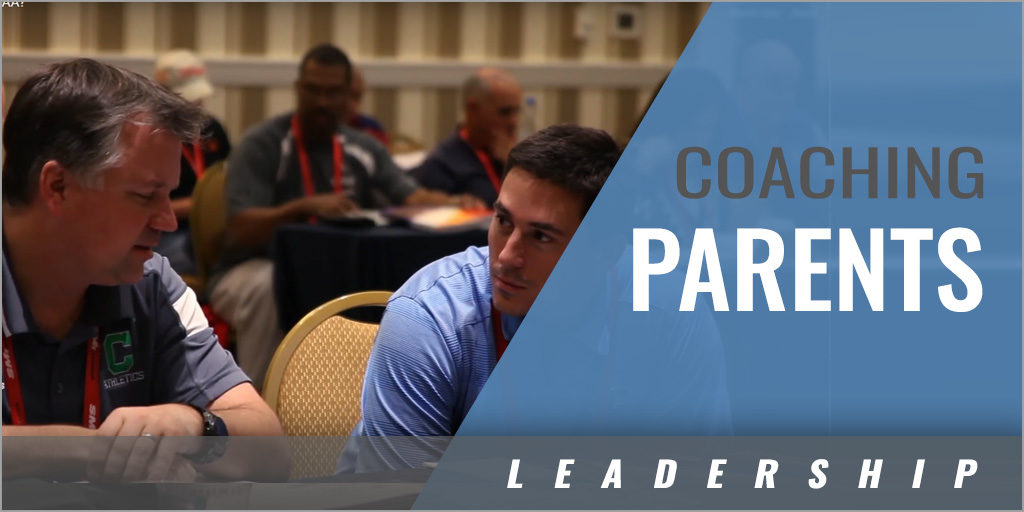By: John Evers, CMAA
I was lucky enough to have several jobs in interscholastic athletics throughout my career. My first job was coaching junior high football and track athletes. I then progressed to coaching and mentoring high school football and baseball players. Finally, I spent many years as a high school athletic director. In the position of an athletic administrator, I often felt a need to "coach" my coaches, fans, patrons, and parents. By far, the toughest group I had to "coach" were the parents of my student-athletes.
All parents have a vested interest in the success of their children. Success in the classroom is the highest priority. Success in athletic competition is a lofty goal. Success in every area of their lives should be the expected standard. Because of these varied interests in the success of their children, parents can quite often lose perspective. A quality athletic administrator should actually coach parents, much like members of the athletic department staff coach student-athletes.
Athletic directors have countless opportunities to meet with parents in a variety of settings. Sometimes it might be as simple as a casual conversation at a practice or in the grocery store. It could be in an organized pre-season meeting with hundreds of people present. Occasionally, these meetings take place in a much more formal setting. Regardless of the venue, there is never a moment when a good coach is not coaching his kids. The same should be true for an athletic administrator. The "coaching" of parents should be an evolving and ongoing process. Continual improvement of the parent is just as important as the ongoing improvement of the student-athlete.
Often, contact with parents can take place in a highly stressful environment. Such moments are not ideal for the educational process. Coaches will tell you that during a game, much of what they say to their athletes goes in one ear and out the other. It is the same for parents. High-stress settings are probably the worst time to attempt teaching or coaching your parents. But still, certain message are needed, regardless of the circumstance. The key is being ready, focused and concise when the "teachable moment" arrives.
I think it is imperative for the athletic administrator to develop a philosophy of education based athletics and use every opportunity to share that philosophy with as many people as possible. The development of talking points to drive home various portions of that philosophy is crucial. If solid talking points are thought out and developed, one or more of those concepts could be shared in a wide variety of settings. It is hoped that, over time, the message will get through to the parents you serve.
Over the years, several concepts continued to come up during my interaction with parents. I tried to capture those thoughts and place them into 10 categories or groupings. In time, I found that one or more of those 10 points could be quickly be employed when dealing with parents that had lost perspective, or were searching for guidance on the purpose of educational athletics. Some of those parents took their interest in the success of their child to a place that was close to crossing a line. Many parents went well beyond that line. As a result, I tried to employ at least one of these constant prompts to attempt to head parents in a more positive direction. Some of the more common thoughts I found myself sharing with concerned parents over the years included:
-
- Enjoy the ride and don't stress over the scoreboard.
Interscholastic sports has a very short lifespan. Parents usually find that the experience is often over not long after it begins. The ups and downs of every day all melt into the past quickly. What seems important today becomes trivial tomorrow. With that in mind, parents should always be reminded to enjoy the precious time they have to witness and enjoy their athletes during the formative years. Winning is always important, but the final score of one contest pales in comparison to the lessons, friendships and skills that young people develop during the process of athletic competition.
-
- Look at the big picture and help your athlete to do the same.
Parents and athletes often develop a form of tunnel vision. All they can see is the immediate outcome of every situation. As athletic directors, we have to always strive to look at the big picture view. We always attempt to view the positives and the negatives through the lens of educational athletics. If we can stress and teach this skill set to our parents and athletes, many of the "problems" of everyday life will slowly fade.
-
- Allow your athlete to guide his or her athletic path.
Most parents have the best interest of their child in mind. Some, however, develop a mission or goal that is not what the athlete really wants. Try to coach your parents to listen to the wants and needs of the athlete. It is often the parent that desires a path that is not the same one envisioned by the athlete as future goals and aspirations are assessed.
-
- Provide emotional support for your athlete.
Sometimes, the best thing a parent can do for an athlete is to just be there. After a great win or an emotional loss, a friendly face is the best tonic. Parents need to be at their best when the athlete experiences failure. A friendly hug from a parent often is the best elixir. Parents also need to be the guiding hand to help the athlete cope with and learn from success with humility.
-
- You don't have to cheer or coach: Just be there.
This is a hard one for parents. Often, the parents want to be on an emotional high with the athlete. This can often produce more pressure than assurance by their approach to every game as if it is a state championship. If positive re-enforcement is call for, it should be applied as needed. If a calming influence works best for the student-athlete, just the mere presence of a parent is enough. An elevated level of emotion on the part of the parent is not the most important trait. Just being there is often what the athlete needs most.
-
- Praise more and critique less.
Athletes feel the pressure of competition throughout their practice and game routines. Coaches and teammates are their toughest critics. Sometimes, after the game is over, the athlete wants to escape from that pressure for a short while. The drive home or the evening meal is not the time to break down the good, bad and ugly of the previous game or practice session. Again, positive thoughts that serve as praise are much more effective that critical statements that can often feel like piling on.
-
- Remember: Your athlete is an individual. So are his or her teammates.
Parents often look at athletes and their teammates as they would those they see playing on the collegiate or professional level. All too often, they forget that their children are young and developing adolescents that are often not ready for the white-hot spotlight. Some love the limelight and attention and some do not. Treat each as in individual and give them the respect they deserve. Criticism of teammates can be just as damaging as criticism of your own athlete.
-
- Don't let the family suffer in the name of athletics.
Many a family has been torn apart by the pressure of interscholastic athletic competition. Quite often, extreme pressure is generated by high expectations on the part of the parent. Allow the opportunity for the family to enjoy quality time together away from the athletic arena. Family time at games is great, but only if balanced with family experiences that has no connection to athletics.
-
- Be supportive of others on your team (parents and athletes).
Not every athlete is as good as bad as your own. Not every parent handles relationships on and off the field of play as you do. It is important that parents be just as supportive of athletes and parents that struggle as they are with members of their own immediate family. It can become very difficult for an athlete when a parent is ripping his or her best friend. The same support that a parent expects for his own child, should be shown to the parents and players on their team.
-
- Be supportive of those that serve your child (coaches, officials, etc.).
The first job a parent is to be supportive of their own athlete. Closely behind that job is the duty to be supportive of all those that serve your child. Whether it is the coach, administrator, trainer, manager or game official, all need the same level of support as your student athlete. If a student athlete sees a lack of respect or support for those who serve, they will begin to develop a similar lack of respect. This lack of respect will foster an unhealthy perspective for the concept of educational athletics.
As I said earlier, parents can be the toughest group for an athletic administrator to coach. But, the successful nurturing and development of parents will lead to the successful development of well-rounded and grounded student-athletes. It is of paramount importance that the athletic director keep parents at the top of the list when working to stress all the positives of athletic competition. Without supportive and well-educated parents, interscholastic athletics can become an extremely tough job. With quality support on behalf of parents, all parties can get the most out of their interscholastic athletic experience.








